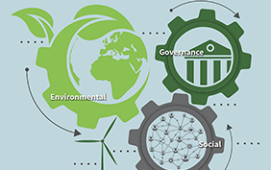
Data science specialist Amsterdam Data Collective (ADC) has grown by helping companies realise the value of data in achieving specific goals, such as building capital position models for banks and improving customer experiences for retailers.
But the Dutch company has now also set its sights on filling ESG knowledge gaps in financial institutions’ risk-management processes. Last month it launched a Sustainability Practice, which will offer consultancy services to help asset managers, banks, insurance companies and other financial institutions incorporate ESG data into their climate-risk and investing analyses. It also aims to bring data science techniques to solving challenges in the food, agriculture, real estate and energy sectors.
ADC is providing expertise to give clients what Sustainability Practice Lead Julia van Huizen calls “end-to-end data chain competency”. It’s a service being offered even to financial institutions that already have sophisticated risk-management provisions in place.
“While banks are quite data savvy many still aren’t sure how to deal with ESG big data,” Van Huizen told ESG Insight. “Sure, you can buy large unstructured data sets but how would you integrate it into your own decision-making core, how would you interpret the results? It’s sometimes very difficult even for large financial companies, so we help to support them.”
End-to-End
While ADC doesn’t provide data it will establish what datasets a client needs to achieve its goals and then go about working on the information to tease insights that can help it build or balance portfolios. The company, which was formed in 2017, will use AI and natural language protocols to create proxy data to fill any gaps. It can then identify how best to integrate that information into companies’ workflows and analytical tools. Finally, predictive tools can be applied to enable data-driven decision making.
Van Huizen, who was appointed last month to head the new team, explained the move was a logical step for a company that had grown by applying new research tools and analyses to solve challenges among clients in the retail, public, financial services and healthcare sectors.
By working with clients, which include ABN Amro and Hello Fresh, ADC found ESG data challenges were shared by all sectors in which it works.
“Sustainability is quite sector agnostic, while our other practices focus more on their sectors,” Van Huizen said. “It means we can collaborate with our other businesses.”
‘Data-Driven Organisations’
Van Huizen was hired after working for more than six years in senior climate risk roles at the Bank of England, the Dutch central bank (De Nederlandsche Bank), and Dutch lender ING. She describes her career as being at the “intersection of climate, Sustainability and finance”, but with a keen interest in other sectors like Agri & Food.
For financial clients, the new venture/practice will walk them through their entire ESG “data cycle”, from sourcing data to making it ready for processing, aligning it with other more structured data and then incorporating it into risk and investment models. For corporates, that could also mean identifying their own pools of data to be used in drawing up ESG and decarbonisation policies. It’s a process that turns clients into “data driven organisations”, Van Huizen said.
For some companies, including banks, there is often a lack of understanding about what data they have and can be utilised, she added.
“Often a lot of clients have a lot of data points, but they don’t use it – it has traditionally been seen as alternative data and how they label this data or consolidate other type of data streams has been a challenge.”
ADC can also help identify synergies within company data sets. Van Huizen illustrates the point with reference to banks, who can use their mortgage property data to help them understand risks associated with flooding in particular places.
“It’s about defining together a strategy on how to use unstructured data and then apply scientific techniques such as AI and machine learning,” she adds.
Broader Horizons
Growing obligations on companies to report ESG data has been part of the impetus behind the opening of the Sustainability Practice at ADC. With the regulatory landscape likely to be in flux for some time yet, Van Huizen expects clients to need a flexible approach to their ESG data processes, meaning they’ll be more willing to use third-party providers for non-typical financial data (e.g. weather) than try to build in-house competencies.
ADC has its sights set on expansion into serving other sectors, including agriculture where technology is becoming more important on the one hand in maximising yields and output to be able to feed the growing population with less land, and on the other hand to do this in a more sustainable way, using less pesticide, producing less waste and fewer emissions). It is also looking at offering consultancy services on harnessing the opportunities within the smart mobility and smart city spaces.
“There is enormous change in all the requirements around ESG driven by our, and the EU’s, net zero target,” Van Huizen said. “It’s an enormous challenge that we face and all companies will need to change part of their business models.”
Subscribe to our newsletter




